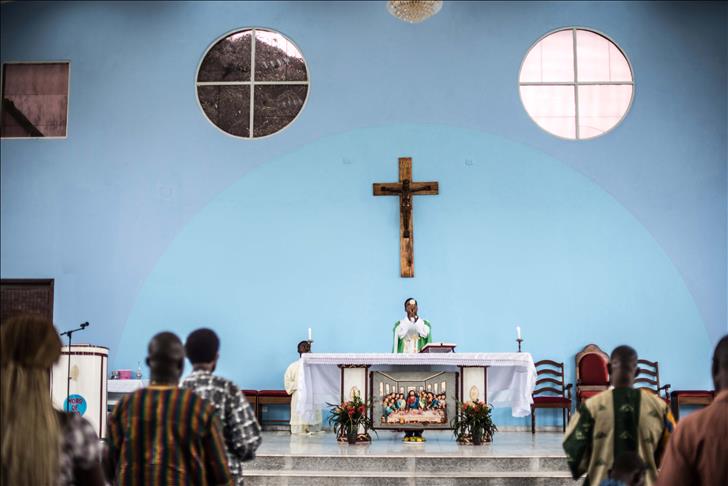Christians, Muslims divided over Liberia's state religion
"The word 'secular' means 'no God,' but the politicians have played with this word to give the impression that secularism means the inclusion of all religions, which is false according to the dictionary definition,"

By Evelyn T. Kpadeh
MONROVIA
A proposed constitutional amendment calling for reinstating Christianity as Liberia's state religion has been backed by the majority of participants in a societal dialogue conference discussing the changes, sending shockwaves through the Muslim community.
"The word 'secular' means 'no God,' but the politicians have played with this word to give the impression that secularism means the inclusion of all religions, which is false according to the dictionary definition," David Success Jallah, a Liberian clergyman, told The Anadolu Agency.
Jallah was one of the country's Christian religious figures who attended a four-day conference in Gbarnga in central Liberia's Bong County to discuss proposed amendments to the country's 1986 constitution.
The Gbarnga conference brought together over 700 delegates from the country's 15 political sub-divisions, along with President Ellen Johnson Sirleaf, government officials, the UN mission in Liberia and international partners.
Stakeholders – including citizens, civil society, and religious leaders – also attended the event.
The meeting came as part of a plan initiated by President Sirleaf, who appointed a Constitution Review Commission (CRC) to review the country's 1986 constitution through nationwide participation, soliciting citizens' views on the articles and clauses they wanted to change.
Religion was the 24th item on the 25-point agenda tabled for discussion in the conference.
According to the country's 2008 national census, Christians make up around 85 percent of the country's population of some 4 million, while Muslims comprise 12 percent.
The remainder adheres to traditional and indigenous beliefs.
Jallah said the country needs to revert to its previous status as a Christian nation, saying it is not a matter of religion, but rather a matter of democracy.
"The issue here isn't about Christians and Muslims," he argued. "The CRC was given a mandate to tour the country and get Liberians' views on what they wanted to see in the constitution."
"And those views showed that 99.4 percent of the people want Liberia to return to a Christian state," he said.
The preamble of the country's current charter states: "Acknowledging our devout gratitude to God for our existence as a free, sovereign and independent state, and relying on His divine guidance for our survival as a nation."
It adds: "Realizing from many experiences during the course of our national existence, which culminated in the Revolution of April 12, 1980, when our constitution of July 26, 1847 was suspended, that all of our people – irrespective of history, tradition, creed, or ethnic background – are of one common body politic."
It is not the first time the issue has come up.
In 2013, the Liberian church collected 7,500 signatures, which it later presented to parliament, calling for the return of Liberia to be a Christian state. The petition, however, was not debated by the assembly.
But this time, Jallah asserted, the church was not the one who put the issue on the agenda along with 25 proposals expected to be tabled in a referendum next year.
"This is the beauty of our country's democracy," he said.
Jallah went on to say that secularism was not the best thing for the nation, saying it had brought "a curse" upon the country and led to underdevelopment and a 14-year civil war.
Raising the item for discussion prompted a protest by a group of people – believed to be Muslims – who carried placards calling for Ethiopia to remain a secular state.
"Let Liberia remains as it," "Liberia says goodbye to war," "Liberia is our only patrimony," and "Liberia is a free land of liberty and justice for all," some of the placards read.
Hajah Swaray, one of the protest's female leaders, told AA that her group wanted Liberia to maintain its secular nature.
"We saw an item on the agenda that says Liberia should be a Christian nation and we are saying 'no'," she told AA. "The way we lived before should remain like that."
"It would not be fair to see one group marginalized. We have 16 tribes in Liberia. Some people are Muslims, while others are Bahai or embrace traditional religions. Let's just live as we are," Swaray asserted.
"Liberia is not for Christians, Liberia is not for Muslims, Liberia is for everybody. We don't want Liberia to be for only one group of people," she said.
But the protest did not faze the majority of participants from backing the controversial article at the end of the conference on Thursday night.
Other adopted proposals included equal representation of women in politics, election of local counties’ leaders and the usage of single currency rather than the already-existing dual currency system.
The proposals will be taken to parliament for endorsement before being referred to the president who will order them put to a referendum in 2016.
Mohammed Dukuly, head of a local Muslim organization, expressed frustration that the proposal was supported with unanimous vote in the conference.
"What is the objective of making Liberia a Christian nation? If the goal is to lead Liberia on Christian principles then what are we going to use as a reference? Are we going to use the Bible or the constitution?" he asked.
"If we are going to use the Bible, then the whole thing is a joke, because many of those calling for the restoration of the Christian stats are living unchristian life," he added. "I don’t think Christians in this country are ready for such a decision."
Anadolu Agency website contains only a portion of the news stories offered to subscribers in the AA News Broadcasting System (HAS), and in summarized form. Please contact us for subscription options.





